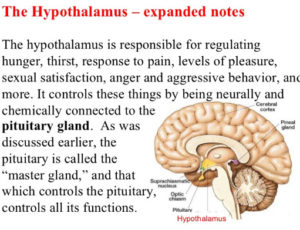What part of the brain controls hunger the hypothalamus

What part of the brain controls hunger? The Hypothalamus.

Hunger is a fundamental physiological sensation that drives us to eat and maintain our body’s energy levels. But have you ever wondered how our brain controls this compelling urge to eat? The answer lies in a small but mighty region of our brain called the hypothalamus.
The hypothalamus, situated at the base of the brain, plays a crucial role in regulating various bodily functions, including hunger and satiety. It acts as the command center, receiving and interpreting signals from different parts of the body to maintain a delicate balance. Specifically, it is divided into two distinct regions: the lateral hypothalamus (LH) and the ventromedial hypothalamus (VMH).
The LH primarily stimulates hunger and motivates us to eat. It contains specialized cells called orexigenic neurons that release neuropeptides like orexin and melanin-concentrating hormone (MCH). These neuropeptides act on other parts of the brain to trigger sensations of hunger and promote the intake of food.
Conversely, the VMH acts as a satiety center, signaling when we have consumed enough food and should stop eating. It contains anorexigenic neurons that release neuropeptides such as alpha-melanocyte-stimulating hormone (α-MSH) and corticotropin-releasing hormone (CRH). These neuropeptides inhibit hunger signals and promote feelings of fullness.

Besides these regions, the hypothalamus also interacts with other brain areas involved in the regulation of hunger and eating behavior. It connects with the amygdala, which processes emotions and can influence our food choices, and the hippocampus, responsible for forming memories of food-related experiences. Additionally, the hypothalamus receives hormonal signals from adipose tissue (fat cells) through the hormone leptin, which helps regulate long-term body weight.
The interaction between these different brain regions and hormones forms a complex network that determines our eating behaviors and manages our energy balance. Disruptions in this network can lead to various eating disorders such as obesity or anorexia.
Understanding the intricate workings of the hypothalamus is vital not only for our physical well-being but also for our mental and emotional health. By comprehending how our brain controls hunger, researchers can develop targeted interventions and treatments to address eating disorders and improve overall health outcomes.
In conclusion, the hypothalamus, particularly the lateral hypothalamus (LH) and ventromedial hypothalamus (VMH), exercises a significant influence on hunger and satiety. Its intricate network of neurons and neuropeptides orchestrates our eating behaviors, maintaining a delicate balance between hunger and fullness. By unraveling the mysteries of this complex system, we take a step closer to promoting healthier relationships with food and optimizing our well-being.
References:
Tags
Share
Related Posts
Quick Links
Legal Stuff

